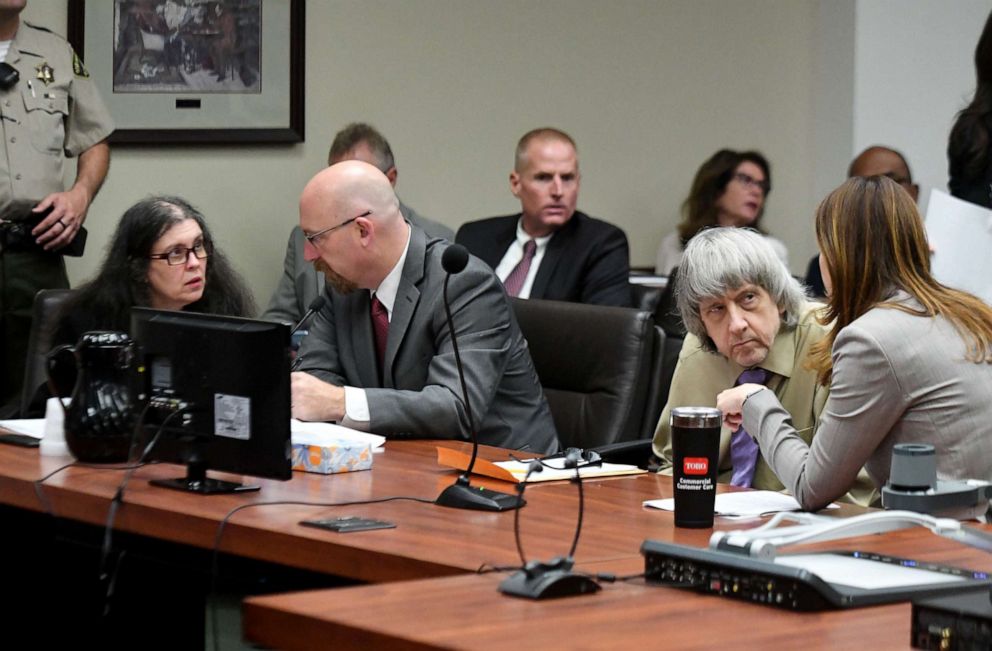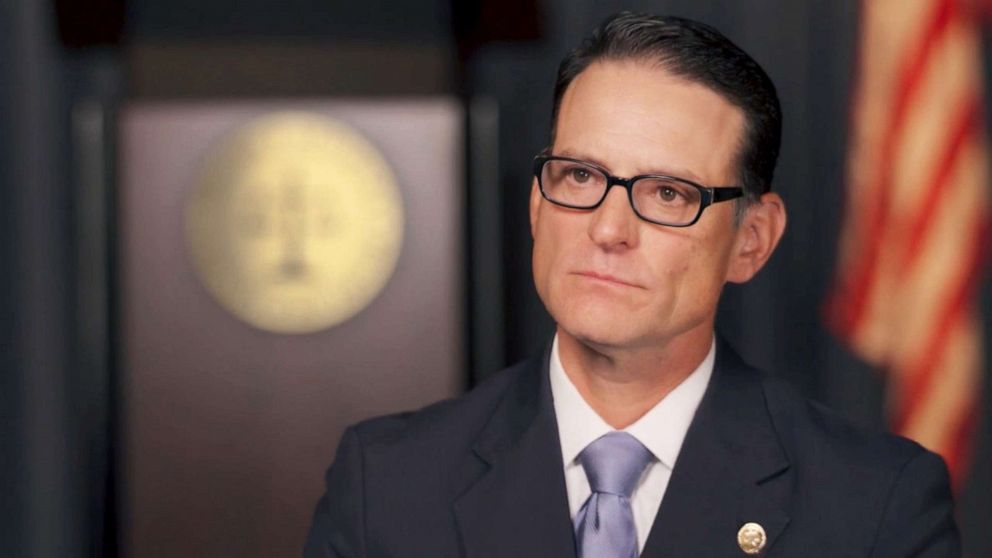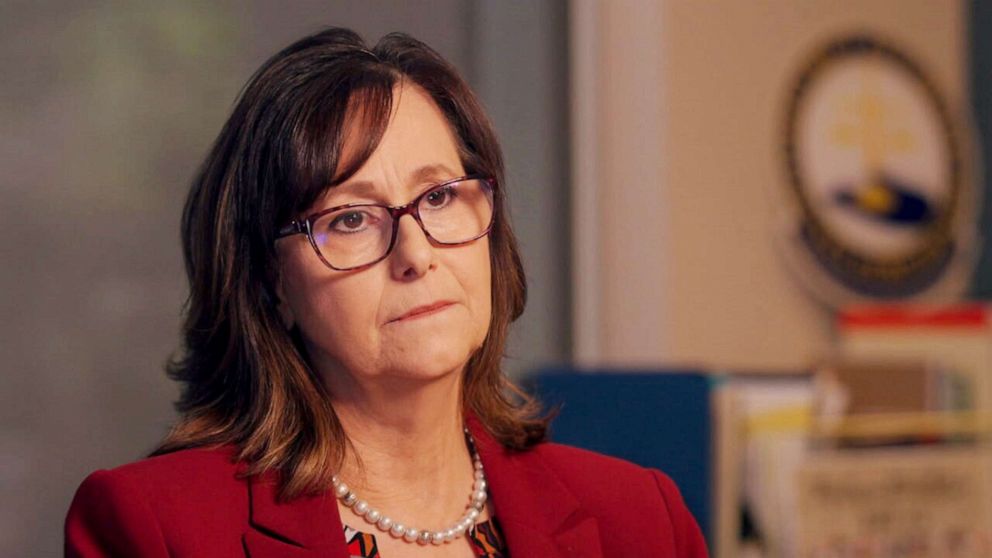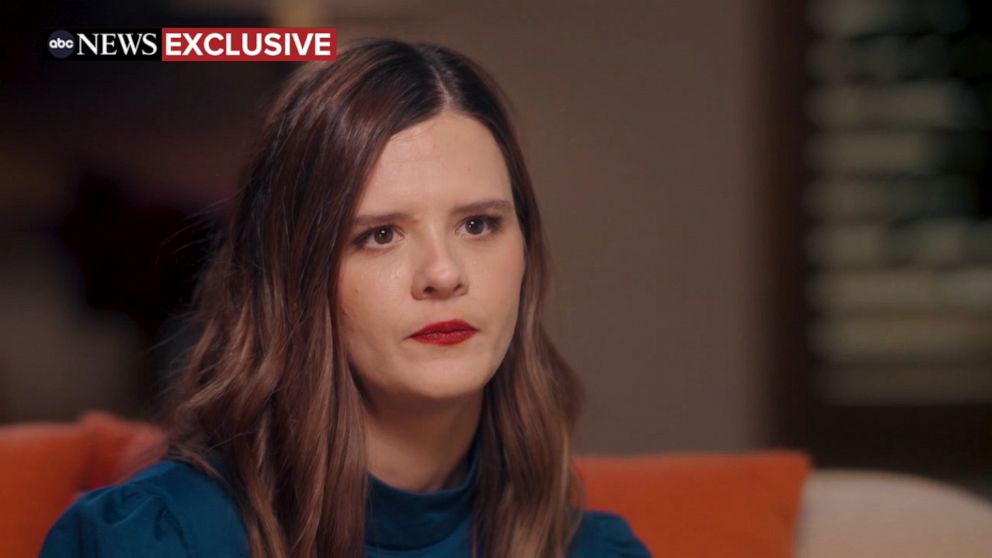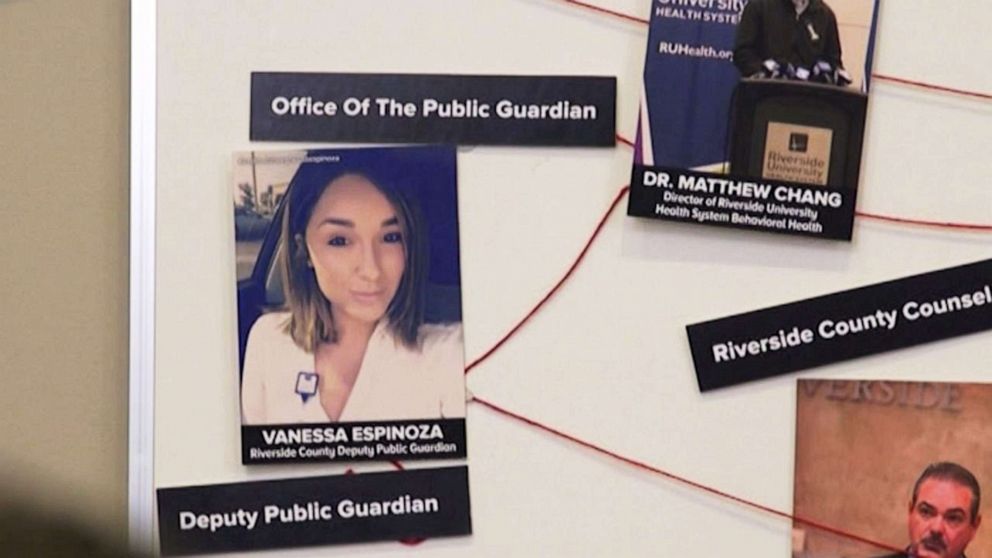Turpin children still 'living in squalor' 4 years after 'house of horrors' rescue, despite donations
Watch the Diane Sawyer special event, 'Escape From A House Of Horror,' now on Hulu

PERRIS, Calif. -- After suffering unspeakable abuses and deprivation at the hands of their parents, the Turpin siblings -- it seemed -- were on the path to a new life: a future with the resources needed to start fresh, to make up for the years they were locked away from the world.
Nearly four years ago, after authorities rescued the 13 Turpin siblings from their family home in Perris, California, where they were subjected to brutal violence and deprived of food, sleep, hygiene, education, and health care, advocates and county leaders assured the siblings -- and a concerned public -- that help was on the way.
We are confident, given what they've been through and how resilient they are, that they're going to be really successful," said Jack Osborn, a court-appointed attorney for the seven adult children, after their parents' sentencing in 2019. "It's going to be really exciting to watch that through the years."
Unfortunately for the Turpin children, who ranged in age from 2 to 29, those promises have fallen flat.
Watch the Diane Sawyer special event, "Escape From A House Of Horror," on Hulu.

Their story attracted an international audience, prompting hundreds of thousands of dollars in donations from generous strangers.
But some officials and some of the Turpin children are now speaking out to say they still do not have access to many of the resources and services guaranteed to them. An ABC News investigation has found the some of the Turpin children continue to face challenges and hardships since they were rescued and placed in the care of the county. Some of them have even faced danger again.
"They have been victimized again by the system," Mike Hestrin, the Riverside County district attorney, told ABC News' Diane Sawyer in an interview for the 20/20 special event, "Escape From A House Of Horror."
MORE: Jordan Turpin details making 911 call moments after she escaped Perris 'house of horrors'

Living in squalor
It was Hestrin, as Riverside's district attorney, who prosecuted the Turpins' parents, David and Louise. They are now serving life sentences in separate California penitentiaries. Hestrin said he and his team are among the few outsiders who have managed to remain in contact with the children -- their lives shielded behind layers of secrecy, mandated by a combination of laws to protect child-abuse victims and a sweeping confidentiality order imposed by the judge overseeing the care of the older siblings.
"They're living in squalor," Hestrin said, referring to some of the adult children. "They're living in crime-ridden neighborhoods. There's money for their education -- they can't access it," Hestrin said.
For Hestrin and advocates for the children, their treatment has been unacceptable -- a tragedy that both shocks and compounds the horrors of their prior life. They say that the very people responsible for actively caring for the Turpins simply did not do their jobs.
SEE ALSO: Turpin children describe 1st experience knowing they were free from 'house of horrors'

The Turpins' dire circumstances are a symptom of failed social programs, critics say, and emblematic of incessant structural deficiencies in the human-welfare systems in one of the largest counties in the country, famous for the resort community of Palm Springs and the Coachella Valley Music and Arts Festival.
"That is unimaginable to me -- that we could have the very worst case of child abuse that I've ever seen," Hestrin said, "and then that we would then not be able to get it together to give them basic needs."
Much of the $600,000 in private donations has been kept from the siblings. County officials, citing court-ordered secrecy, have refused to provide ABC News with any information about the trusts, including how much money has been distributed to the Turpin children and the justification for refusing some requests for financial assistance made on behalf of the children.
Despite a host of benefits available to the children through a litany of government programs and those pledges of support, several of the adult Turpin children continue to be subjected to dangerous living conditions and a lack of meaningful access to basic needs, like health care, transportation, food and even safe and stable housing.
After their rescue, some of the younger siblings spent years in foster homes where there were accusations of child abuse -- including an accusation that at least one of the Turpins was a victim of such abuse, for which charges have been filed. Two of the older children have at times had to resort to "couch-surfing," one advocate said, and, in at least one case, another was assaulted.
"I don't really have a way to get food right now," Jordan Turpin, 21, told ABC News' Diane Sawyer when they met in July. At the time, Jordan had just been released -- she says without warning -- from extended foster care with no plan for food, health care, life skills training, or even shelter.
"Well, where I live is not the best area," her sister Jennifer, 33, said.
WATCH | Turpin sisters who escaped 'house of horrors' speak out: 'I thought I was going to die'

Shielded in secrecy
ABC News' investigation has yielded few answers from county officials. The Turpins' case remains shrouded in secrecy -- obscured from public view through sealed court records and a conservatorship, the same arrangement that recently ended for pop star Britney Spears.
State law mandates confidentiality on all juvenile court proceedings, effectively shielding the records of the minor Turpin children. But in the probate court overseeing the adult Turpin children's cases, a blanket sealing order has been issued as well-- an unusual move enacted right after the children were rescued in order to protect them from the onslaught of media coverage.
Nearly four years later, and with nearly all media coverage gone, the order sealing almost every record in the case remains in place, effectively blocking any scrutiny from the public. In late 2018, Judge Thomas Cahraman, overseeing the conservatorships, expressed concerns that the sealing order was "too broad" -- but he ruled to keep it in place.
Until this month, that is.
Just four days after ABC News requested from the court an explanation for the sealing order, Judge Cahraman unsealed a few of the filings partially explaining the secrecy in the case. The newly available documents shed no light on the Turpins' care or lives since they were rescued, but the unsealing did mark a first for the case.
Reports detailing the children's well-being, records accounting for the hundreds of thousands of dollars raised by strangers, and other documents in the court filing remain sealed.
But advocates and several of the Turpins themselves have come forward to share troubling tales of their plight. Melissa Donaldson, the Director of Victim Services in Riverside County, said some of the children told her they "felt betrayed" by the county.
"Did we see kids having to not have a safe place to live or stay at times? Yes. Did they have enough food at times? They did not," Donaldson said. "They had to go to churches and eat because they didn't know how to manage money ... and some without housing at times."
Donaldson, through tears, explained that basic needs remain elusive, and the kids continue to struggle to navigate a complex and bureaucratic system they have no experience with, despite a global outpouring of support. She said the county dismissed inquires from numerous health care professionals offering free services for as long as the Turpins needed them.
"When the case first broke, I obviously got thousands of offers of help ... dentists, and doctors, and people saying, 'I will serve these kids pro bono. Please send them my way,'" she said. "I had to pass on those referrals to the Child Protective Services workers and the hospital. And none of them were utilized."
"You rarely hear folks like you speaking out publicly about your work. This is the exception," ABC News correspondent David Scott told Donaldson as she explained what the last four years have been like for the Turpin children. "Tell me why."
"Because we have to fix it," Donaldson replied. "You would think that this is the time to really get it together and do everything we can. And we didn't do it that way."

"Just Google it"
A major challenge for the Turpins has been accessing the state and county social service programs they were entitled to, as well as the donations that came in following their parents' arrest. Most of the funds have gone into a trust that is controlled by a court-appointed public guardian, but details about the guardian -- and the money -- are hard to come by.
Officials refused to explain what money, if any, has been spent. Recent court filings show the court-appointed public guardian failed to file the annual accounting for the trust, leaving the family's finances opaque.
One of the siblings, 29-year-old Joshua Turpin, said he struggled to access funds for needs as simple as day-to-day transportation.
"When I try to have access [to the money], I have difficulty," Joshua said.
"I requested -- I called the public guardian's office and she refused to let me request for a bike," Joshua Turpin said, referring to the public guardian's office. "And I contacted my attorney, Jack Osborn, and he refused to let me know who was over charge of my trust."
In an email, Osborn told ABC News that his "representation of the adult Turpin siblings was limited to the conservatorship proceedings and certain limited issues the probate court requested." He said he was aware of problems but that he did what he was supposed to do as the court-appointed attorney.
"Within our representation, we continuously advocated for services on behalf of our clients," Osborn said. "It appears that, once ... there ceased national attention, the urgency in providing these essentials to our clients by certain county agencies significantly declined."
Osborn also said issues related to the trust "were not within the scope of [his] representation."
A lawyer for the children's trust did not respond to several inquiries from ABC News.
Throughout the course of ABC News' reporting, Vanessa Espinoza's name came up over and over. As the deputy public guardian assigned to the seven adult Turpins' cases, Espinoza was responsible for helping the older children secure housing, health care, food support and education, and for aiding them as they learned to navigate the whole array of public benefits systems adults deal with everyday.
Joshua Turpin said that when he would seek Espinoza's assistance, "she would just tell me, 'Just go Google it.'"
"She wasn't helpful at all," he said.
ABC News learned from state records that Espinoza, while working full-time for the county, was also a real estate broker on the side.
Records also show that Espinoza used to work for Osborn and his firm before leaving to take on her role at the public guardian's office. In his statement to ABC News, Osborn said the relationship was disclosed to the court.
Espinoza did not respond to repeated requests for comment. When ABC News attempted to meet up with her last week, she avoided cameras. The next morning, a county spokeswoman said Espinoza had not worked there since Aug. 21, declining to say anything more because of both personnel-confidentiality rules and the court's order of secrecy in the Turpin cases.
The head of the county's Public Guardian office, Dr. Matthew Chang, lauded his office's work in a statement to ABC News, saying he "stand[s] by the exceptional work provided within the Public Guardian Program."
Chang said he "welcome[s] an independent and comprehensive inquiry into the care, services, and placement provided to the 13 Turpin siblings by Riverside County departments."
Repeated abuse
As the adult children struggled under county guardianship, some of their seven younger siblings faced new hardships in the foster care system and the California-based agency contracted to run it by the county.
According to public records reviewed by ABC News, ChildNet has in recent years been the subject of dozens of investigations into allegations of verbal and physical abuse in its foster homes -- many of which have been substantiated by state investigators.
In more than two dozen cases, ChildNet foster families were found by state investigators to have mistreated their foster children, including in some instances hitting and choking them, denying them medical attention and forcing them to sleep on the bathroom floor, according to public complaint reports reviewed by ABC News. In most cases the parents were retrained rather than removed.
ChildNet is part of a larger county social services system that experts say had a history of failing to protect abused children even before the Turpins entered the picture in 2018.
"What we've seen over and over again is situations where there was clearly abuse happening-- the evidence was just overwhelming, and there seemed to have been a policy by the county to basically never remove kids," said Roger Booth, a Los Angeles-area attorney who has represented multiple children abused in Riverside County.
"Really what we've seen in the cases that we've looked at is, unless you have a child who dies or a child who ends up pregnant as a result of sexual abuse, then nothing happens," Booth said.
In a statement to ABC News, a ChildNet spokesperson said the company was limited in what it could say because of confidentiality laws, but they stood by their work.
"We take our work very seriously, including the extensive vetting of resource parents which is subject to state law," said Brett Lewis, the ChildNet spokesperson.
California's Department of Social Services initially told ABC News that records and documents related to ChildNet would be available by Nov. 5, but they have yet to provide them. A spokesperson did not respond to ABC News' request for comment.
The Turpin children have been relocated several times, according to county officials working on the case and the children themselves. One foster family now faces criminal charges in connection with their alleged mistreatment of several of their foster children, including one of the Turpin minors.
Five Turpin children remained in that home for three years while the alleged abuse took place. A lawyer for one of those family members said, "The family are devastated by these charges. At this point, we do not know the basis for these charges, and my client is denying these charges are true."
The five children had even been adopted by that family in October 2019, the same time-period in which the alleged abuse was occurring. ChildNet declined to provide details about the vetting of the family, citing confidentiality laws.
"Have there been other issues that have come to light in the many foster care homes in which the minor Turpin children have been placed?" Scott asked Donaldson.
"One adult -- that was a minor, now an adult -- she has reported...one foster parent telling her she understands now why her parents chained her up," Donaldson said. "The comment was egregious."
After a Nov. 9 meeting of the county's Board of Supervisors, Chairwoman Karen Spiegel, the county's top elected official, declined to discuss specifics about what has transpired with the Turpin children since they were rescued.
"Well I am not -- I don't have the information you're looking for," Spiegel told ABC News. "We're still in investigation stages, so I don't have anything to share with you."
In a lengthy statement to ABC News, Riverside County Executive Officer Jeff Van Wagenen acknowledged that "there have been instances in which those we seek to protect have been harmed," and said his office has hired an outside law firm to "conduct an independent and comprehensive investigation" into what happened in the cases of the 13 Turpin children.
Van Wagenen also outlined several of his office's "efforts to progressively transform the county's child welfare and dependent adult systems," which include improved training and auditing protocols.
Beyond the specifics of the Turpin case, the district attorney who first noted problems in the months right after the Turpin rescue told ABC News that the mistreatment of the 13 siblings has exposed serious systemic fissures that exist across the American social services system -- where the most vulnerable should be able to seek help in their time of need.
"If we can't care for the Turpin victims," Hestrin said, "then how do we have a chance to care for anyone?"


